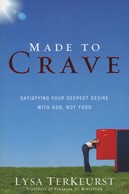How to Replace Food Cravings with God Cravings
- Whitney Hopler Crosswalk.com Contributing Writer
- Updated Feb 14, 2011

After a stressful day, when you're seeking peace, do you spend time with God in prayer? Or do you find a few minutes of comfort with a plate of brownies? When you're dealing with a situation that makes you sad, do you talk with God about how you feel? Or do you open a bag of potato chips to try to numb your sorrow?
God has made you to crave Him - not food. If you rely on food to satisfy you, you may experience temporary satisfaction when you eat, only to be hungry again, following a vicious cycle of cravings and hunger that will never lead to real fulfillment. The food you consume can consume your life that way.
So learn how to fulfill your deepest desires with God rather than food. Here's how:
Ask God to give you the desire to be healthy. You probably already know a lot about how to eat nutritious foods in ways that will help you enjoy good health. But if you're struggling with food cravings that are causing you to make unhealthy food choices, you need to want to be healthy. So pray for the desire you need to motivate you to pursue better health spiritually, physically, and mentally.
Use your cravings as promptings to pray. Start a habit of responding to each unhealthy food craving you experience with prayer, asking God to help you find satisfaction in healthier choices.
Create a plan to change. Consider what unhealthy eating habits you currently have, as well as how you need to change in order to eat in truly healthy ways. Meet with your doctor or a nutritionist for advice. Then create a plan that details specific changes you want to make to how you eat. Don't give into any excuses that will hold you back. Keep in mind that, although you'll need to make sacrifices, the point isn't to deny yourself but to embrace healthy choices that will help you enjoy a better life.
Get some friends involved. Ask at least one of your friends to join you on the quest to eat healthier. Encourage each other and hold each other accountable as you track your progress together.
Embrace your true identity. Recognize that God made you for much more than being stuck in a vicious cycle of unhealthy eating that leaves you feeling defeated and imprisoned. So embrace your true identity as a person who is loved and meant to be free, confident, and holy. Keep in mind that living in spiritual victory will be sweeter than any food you crave right now.
Live by the Spirit. Pray regularly for the Holy Spirit to give you the wisdom and self-control to avoid food that isn't beneficial to your health. As you break free of consuming thoughts about food, invite the Holy Spirit to show you your calling in life more clearly and empower you to pursue that calling more confidently.
Fill your mind with biblical truth. Replace the lies you've believed about food (such as that it can make you happy) and yourself (such as that you're not worth as much if you're overweight than you would be if you were physically fit) with thoughts that reflect biblical truth. Read the Bible often, and memorize verses that help you see yourself and your relationship to food accurately, absorbing them into your soul so they'll be there to encourage you when you encounter the temptation to eat in unhealthy ways.
Make peace with your body. Even though your body will never be perfect in this fallen world, recognize that it's a good gift from God. Decide to do the best you can to take good care of the body God has given you.
Move your body. Create a plan to exercise regularly, doing types of exercise that you genuinely enjoy, so you'll be likely to stick with your plan.
Don't compromise. Ask God to empower you to stick with your healthy eating and exercise plans all the time - even during special times such as vacations and holidays - since one compromise easily leads to another, which leads to failure. But if you consistently make one wise decision after another, you'll enjoy victory.
Call sin what it really is. Overeating or indulging in too many unhealthy foods is gluttony, which the Bible says is a sin. When you sense that you're harming your body through gluttony, confess that gluttony as sin to God and repent of it, making sure to limit your portions to the right amounts when eating.
Recognize emotional triggers so you can deal them. Pay attention to the ways in which your emotions are triggering you to eat in unhealthy ways. For example, if you notice that you turn to food for comfort when you feel disappointed or frustrated, use that knowledge to make yourself pause the next time you feel those emotions, and decide to pray about your feelings rather than responding to them by eating.
Let yourself be hungry for holiness. As you practice the discipline of denying yourself unhealthy food you used to enjoy, your soul will learn more about longing, which will motivate you to crave more of what will ultimately fulfill you - a closer relationship with God. When you're hungry, you can discover how to become more holy. So pray for God to unsettle your soul so you can break free of all the unhealthy habits that have been pulling you away from God. Then enjoy filling your soul the love God will give you when you draw closer to Him.

Lysa TerKeurst is the president of Proverbs 31 Ministries and the author of 12 books (including a Gold Medallion finalist and a People's Choice Award finalist) and numerous magazine articles. She has told her remarkable life story on national television and radio, including Oprah and Good Morning America. She lives in North Carolina with her husband and five children.
You can sign up for more from Lysa and Proverbs 31 Ministries by visiting the Encouragement for Today devotional available through Crosswalk.com.
Publication date: January 20, 2011

.jpg)


















